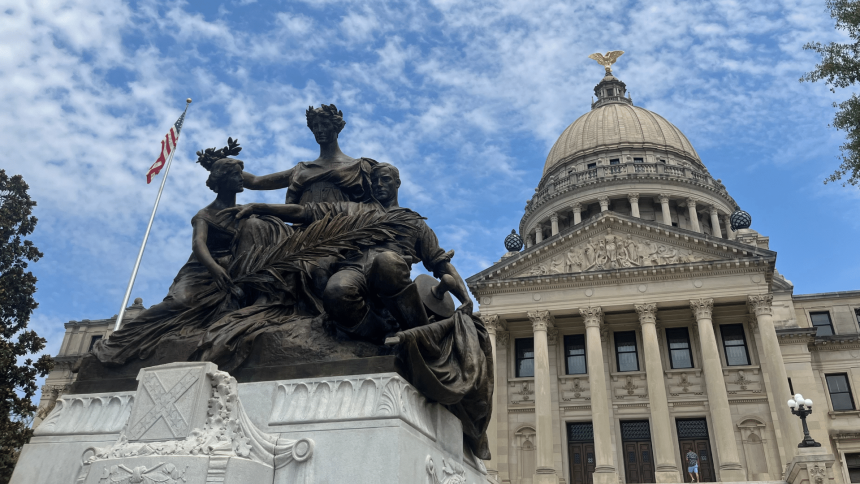Mississippi lawmakers, at the urging of Republican Gov. Tate Reeves, made quick of their second session at the state capitol this year after failing to pass a budget funding state operations the first time around.
The House and Senate reconvened in Jackson on Wednesday and wrapped up the special session on Thursday evening, rounding out the budget for Fiscal Year 2026 at $7.135 billion. Republican Lt. Gov. Delbert Hosemann told his chamber that the process “should have been much easier,” but he is proud of lawmakers’ work to approve a “prudent, conservative budget.”
“Today, you finished a prudent, conservative budget which positions Mississippi for a continued positive financial horizon,” he said after adjournment. “You have done the work the citizens set you to accomplish. I personally appreciate each and every one of you.”
The incoming fiscal year begins on July 1, and according to lawmakers, all state agencies are on pace to be funded at around the same rate as a year ago. K-12 education received $3.34 billion, Medicaid $969.9 million, public universities $838.4 million, department of corrections $438.2 million, and community colleges $299.4 million, to name a few.
The process wasn’t seamless, though. Before lawmakers gaveled back in, Democratic leaders accused Republicans of a lack of transparency. After Reeves confirmed to media members days before the session begun that he, Hosemann, and House Speaker Jason White had approved a budget draft that negotiators from both chambers came up with, the minority party said it wasn’t sent to them in a timely enough fashion.
“In a representative democracy, transparency is not optional – it is essential,” Sen. Derrick Simmons and Rep. Robert Johnson, minority leaders in their respective chambers, said in a joint statement. “Legislative members from both chambers and all parties must be afforded a meaningful and sufficient opportunity to review legislation in order to effectively question and/or debate measures that will directly impact the lives of Mississippi citizens.”
Republican leaders said they sent a summary to all members in the days leading into the session and encouraged them to ask questions ahead of the special session.
While Republicans did not need any Democratic votes with their supermajority in both chambers, Democrats did not let their qualms go. In the Senate, most to all voted either present or against all budget-related bills. In the House, Democrats demanded the bills be read in full for at least most of the first day, which resulted in lawmakers working until after 1 a.m. on Thursday.
It wasn’t so smooth within the Republican party, either. Hosemann blamed the House for sending three bills over that were not in the call set by Reeves. Under the state constitution, the governor is given the sole power to set the agenda for a special session.
“There were three more significant bills that came from the House, which were not on the governor’s call and did not reflect the agreement of the House, the governor, and the Senate,” he said.
White, the leader of the House, took a shot at the Senate for refusing to pass any special projects outside the scope of core government functions. The intraparty dispute over what politicos often refer to as a “Christmas tree” bill – legislation that includes hundreds of millions of dollars for projects for specific districts or interests – was one of the hold-ups that resulted in budget talks floundering earlier in the year.
“We are disappointed in the Senate leadership for not supporting worthy projects for cities and counties,” he said. “We believe Mississippians find their tax dollars well spent when bridges are built, roads are repaired, and sewage issues are addressed in their hometown.”
White also reiterated his view that the reason lawmakers had to wait until a special session to get a budget done is because the Senate was unwilling to begin negotiations until late in the regular session. Typically, lawmakers wait until late in the session to negotiate the state’s multi-billion-dollar budget for the incoming fiscal year. The weekend can often be a blur and result in bills hurriedly being passed, opening the door for misspent funds. White told his chamber in March not to show up for conference weekend in a stand against the status quo.
He said Thursday that his efforts to begin negotiations earlier will not stop.
“Some were frustrated that the budgetary process went into a special session this year. The House communicated clearly and consistently with the Senate that the budget would not be finalized with little oversight,” he said. “In the 2026 legislative session, the House will maintain its stance that the budget should be developed early and in an orderly manner with transparency.”
White added that even though lawmakers “may not have perfected the process yet,” the budget approved this week is conservative and “reflects the priorities of the state and funds core functions of government.”
Hosemann did note that Reeves’ office will be responsible for a bit of clean-up duty before the governor can sign off on the budget. For example, according to the lieutenant governor, there is a provision in one bill that could jeopardize $900 million in federal Medicaid funding.
“On these matters, in meetings with the governor today, he has stated his intention to use his constitutional authority to deal with the concerning items and he requested the Senate to complete our work today and not to extend the session,” Hosemann said.
Reeves also acknowledged the hiccups but wrote on social media that the overall basis of the budget keeps Mississippi “in the best financial shape in state history.”
“Yes – this should have been completed in regular session. But once clear that was no longer an option, the two sides worked diligently to find an agreement that met my specific criteria and passed it while minimizing the coast of a special session,” he wrote. “And, yes, in the very few instances where final decisions were made that didn’t meet those criteria, I will use my constitutional authority to address them.”
Lawmakers will now begin offseason work before returning to the capitol in January 2026.








